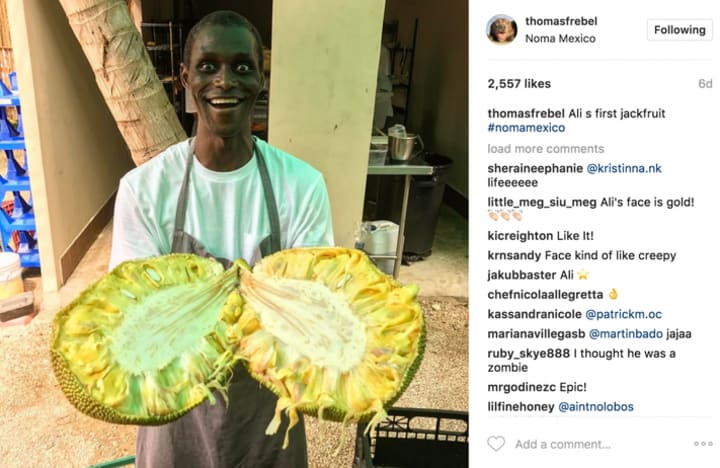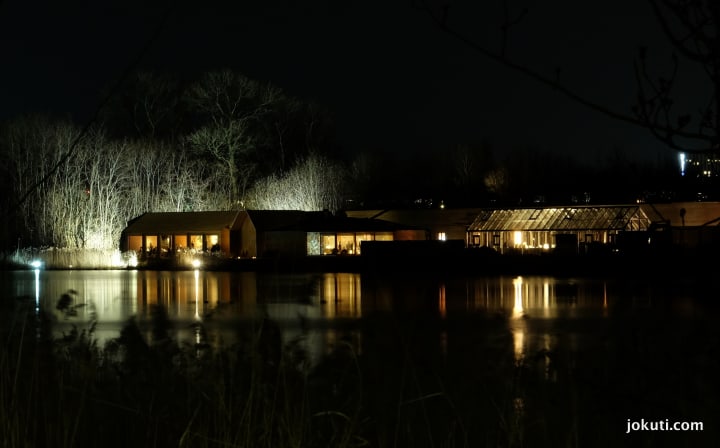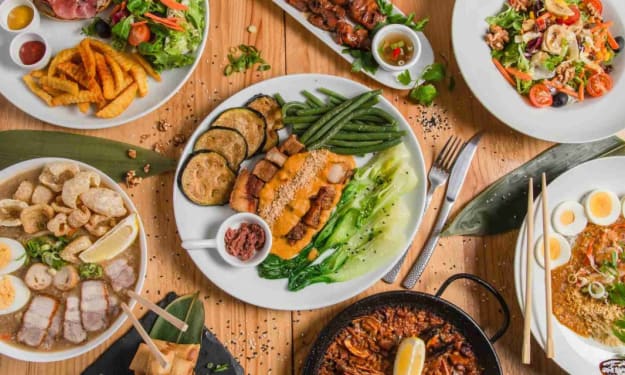Farmer, Dishwasher, Millionaire
How a Gambian farmer became part-owner of Restaurant Noma in Copenhagen

Imagine, for a moment, that you’re on your way to dine at one of the world’s best restaurants. Maybe you’re going to Mirazur, entranced by the glamorous French Riviera and breathtaking views of the Mediterranean. Or, possibly, you’ve chosen Lima’s Central, and you’re ready to experience an adventure through Peru via the restaurant’s elevation-inspired tasting menu. Or perhaps you’ve been hearing about René Redzepi on shows like Chef’s Table, Ugly Delicious, or Parts Unknown, so you’re off to Noma in Copenhagen to see what this New Nordic cuisine is all about.
But what’s it like when you arrive? Not when you walk in, not when you’re seated, not when you're eating. When you're inside that very first moment, stepping out of the car.
If you chose Noma, the answer is simple: Ali Sonko greets you with his endearingly heartfelt smile, a word of thanks, a gentle handshake, and casual conversation. Ali is, as Redzepi says, “the heart of Noma,” and it’s hard to argue that once you’ve met him. Rain or shine, Ali will guide you to Noma’s doors with a special kind of grace and warmth that instantly makes you feel like you’re not only welcome, but deeply appreciated and being taken care of.

So, who exactly is this man, then? He’s not a chef; you meet all the chefs at Noma as you walk to your table. He’s certainly not someone who was hired on as a host, nor is he a hospitality manager or the maître d’.
No, Ali Sonko is a dishwasher.
An immigrant from Gambia, Ali has been working in Noma’s dish pit for almost two decades. He is the father of twelve children, and he was a farmer before he moved to Denmark in 1983. If that alone isn’t enough to make you feel exhausted, consider the fact that Ali is now in his mid-sixties, still showing up to work with a smile regardless of how things are going in his personal life. And working for Noma is no joke; as a two-Michelin-star restaurant which has been named Best in the World four times by Restaurant magazine -- a very prestigious position in the food world -- the standards, and stakes, are incredibly high. As any dishwasher in a professional kitchen will tell you, it’s typically an unforgiving job at best. Despite being the fulcrum upon which a smoothly-run restaurant stands, wherein the health and happiness of customers is protected by thorough cleanliness and efficiency, these hard-working pot scrubbers are often treated with the least respect.

If I’m being honest, I can’t imagine working as a dishwasher. It’s not even a job I enjoy in my own home; currently, my daughter is our dishwasher, which means when she leaves for college in a few short years, I will be doubly sad -- not just for her absence, but for my inevitable return to the sink and suds. Because of this, I admire the efforts of those who choose to take up the towel in the lowest ranks of the restaurant hierarchy, polishing piece after piece of expensive dinnerware and washing each saucepot until everything shines. I, certainly, would not want to be in their shoes. However, as Anthony Bourdain famously and repeatedly reminded us, these bottom-tier workers play a major role, as they are the very backbone of a successful restaurant. Bourdain “learned every important lesson of [his] life” when he started in the restaurant business, and many other famous chefs have touted the job as being the best way to enter the world of fine cuisine. When taken in such a light, the importance of fair treatment across the board in restaurants is all the more apparent; the need for even the lowly dishwasher to feel essential and respected is fundamental.
It is only fitting, then, that Ali is an absolute treasure in the eyes of Chef Redzepi. In 2010, when Noma first received the “World’s Best Restaurant” title, Ali was invited to attend the awards ceremony with Redzepi and his team. Unfortunately, due to his status as an immigrant, he was unable to join them without a visa. So, what was the innovative staff to do without their favorite crew member? Wear his face on their t-shirts, of course. The attending group had shirts emblazoned with Ali’s trademark smile so that he, and his status as a highly-valued kitchen member, could be seen by all the world.

Two years later, Ali was able to travel with his coworkers to London for Noma’s third “Best Restaurant” award, where he gave a reception speech. From farming in Gambia to speaking for the number one restaurant in the world -- Ali has had quite the journey.
According to Redzepi, Ali Sonko is “one of the top-paid people in the entire kitchen,” and that he “holds as much respect as the best head chef or sous chef.” In 2017, Redzepi put some serious weight behind those words when he made Ali part-owner of the $20 million-odd holding company overseeing the business-related aspects of the restaurant. With potentially limitless growth in the company’s future and an already impressive foundation, Redzepi has effectively made sure that the Sonko family will be taken care of for a very long time, if not for life.
"They show enormous respect towards me, and no matter what I say or ask them, they are there for me." - Ali Sonko on working at Noma
It should come as no surprise, then, to hear that Ali has thoroughly loved his job from the start. During an interview with the Danish tabloid BT, he said, “I cannot describe how happy I am to work here. These are the best people to work with, and I am good friends with everyone. They show enormous respect towards me, and no matter what I say or ask them, they are there for me.” As someone who has worked in the lowest tiers of a fast-paced, high-pressure environment, the very belly of the beast as it were, I cannot help but feel a strange sense of admiration for both Ali and his coworkers. It seems as though he was lucky to land a job at Noma, yes, but Noma is all the luckier for having hired him.
Ali has also followed Redzepi and his crew as they traveled around the world looking for inspiration and setting up temporary, “pop-up” style restaurants. Most notable among these pop-ups was Noma Mexico, which was criticized for its price tag and seemingly exclusive entry, but also praised for its vibrant, “transformative” menu as well as its celebration of Mexican flavors and willingness to hire local professionals (read: mothers and grandmothers) to make the tortillas as perfect as they needed to be. And when the original Restaurant Noma shut down in 2017 so Redzepi could start from scratch on a new path with Noma 2.0, Ali was given the singular honor of taking down the sign.

I do believe there is a lesson to be learned here. Ali Sonko’s story cannot only be regarded as one of “rags to riches” triumph; it also embodies the very spirit which ought to be driving us as a society to do better by our neighbors. If you take a moment to appreciate the genuine, mutual gratitude and admiration between Ali and the rest of Noma, and if you allow yourself to equate success with something more meaningful than fame or dollar signs, you will see that Ali is what we all should strive to be: Kind.
Kindness is the heart of true success. We, as humans, need to push ourselves to see the value in others, no matter how different they are, no matter the color of their skin, the land of their birth, or the name of their god. And while it is painfully true that kindness cannot pay bills in and of itself, I would argue that when it is truly expressed by all, many of our worries fade away. Employers see employees as people, not numbers, and recognize that their needs are valid, their lives no less important, their limitations and abilities more than just a value on a spreadsheet. This, in turn, frees up the employees to approach their place of work with meaningful dedication. What a joyous world we would be if only we could embrace such an attitude towards our neighbors, our jobs, our lives. It is only when we push ourselves to see the good in others that we begin to understand how we are, all of us, part of the same earthen household.
Our humanity rests in kindness, and Ali Sonko is a shining example of what it means to be human.

One year ago, at the end of January 2020, my husband and I had the pleasure of meeting Ali when we took an extraordinary trip to Copenhagen to dine at Noma. We had heard of his newfound status as part-owner, and we had heard that he was friendly and enigmatically jubilant, but nothing could have prepared us for just how wonderfully we were treated upon our arrival. We are neither rich nor “important” people, and as such, our reservation at Noma was nothing short of a once-in-a-lifetime stroke of luck, circumstance, and serendipity. The weather was poor, a drizzle-sodden evening after an overcast and chilly day, and there we were in our nicest $50 outfits and a conventional city taxi. And yet, Ali opened my door, offered his hand to me as if I were a movie star, and shielded me from the wet with his umbrella. He greeted us as if we were old friends, smiling, clasping our hands between his and asking us how we were, shining a spotlight on our already overexcited hearts. Though our entire experience at Noma was unforgettable, from every staff member welcoming us in unison as we entered the restaurant to the absolutely incredible New Nordic cuisine, it all started with Ali making us feel as though we truly belonged there.

Through hard work, dedication, and a “megawatt” smile, Ali has earned his seat at one of the world’s best tables. Once a farmer, now part-owner of a world-renowned restaurant, his 4,000-mile journey from Gambia to Copenhagen has also made him a teacher and inspiration to future generations through simple kindness and joy. Our world could use many more Ali Sonkos in it, and I for one am hopeful that all of us will one day learn, either directly or indirectly, from his example.
Thank you, Ali Sonko, for making the world a little bit brighter.

About the Creator
Kristy Ockunzzi-Kmit
Kristy Ockunzzi-Kmit is a fiction, fantasy, and sci-fi author from Cleveland, OH. She is also an artist, spending her free time painting and sculpting. Happily married to composer Mark Kmit and mother to one very imaginative teenager.






Comments
There are no comments for this story
Be the first to respond and start the conversation.